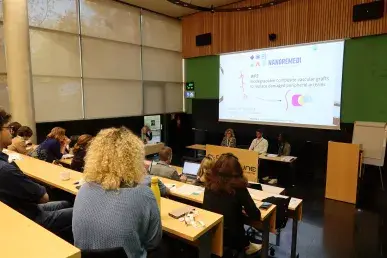NanoReMedi, an innovative research project on regenerative medicine
CIC nanoGUNE is participating in the EU-funded NanoReMedi project which offers early stage researchers the opportunity to pursue an innovative research project in functional nano-scaffolds for regenerative medicine, within a joint doctorate educational training model.

Repair or replacement of tissue and organ functions, lost due to age, disease or damage, represents one of the most urgent medical needs of our aging society. The NanoReMedi consortium will contribute to addressing this fundamentally important issue by using a new and efficient scientific approach, relying on the design, preparation, characterization and validation of peptide-based functional nanomaterials. Peptides are biological molecules with an enormous range of physicochemical and especially biological functions, so they can be, for example, tailored to induce or to support cell growth.
In this promising area, NanoReMedi works as a multidisciplinary European network, composed of six universities, a research center and twelve small and medium-sized companies, which will provide state-of-the-art training for early stage researchers.
“A good example is our concept for innovative grafts for blood vessels. The material has to be elastic, and to help cells to integrate into a newly forming “wall”, but it should ideally degrade or dissolve after the graft is complete. Such different properties, often apparently contradictive, ask for peptide nanofibers”, said Alex Bittner, the head of the project at nanoGUNE.
The pre-doctoral researchers Konstantina Mitropoulou and Matteo Bottiglieri have joined the NanoReMedi project in the Self Assembly Group at nanoGUNE. These two young scientists, selected by the project consortium, will work on synthesis and characterization of ultrathin peptide fibers. Both agree that “doing a PhD within the EU consortium at nanoGUNE is a great experience, because it offers a multidisciplinary working environment, from biology and chemistry to physics, and a multicultural environment in a high quality research center”.
